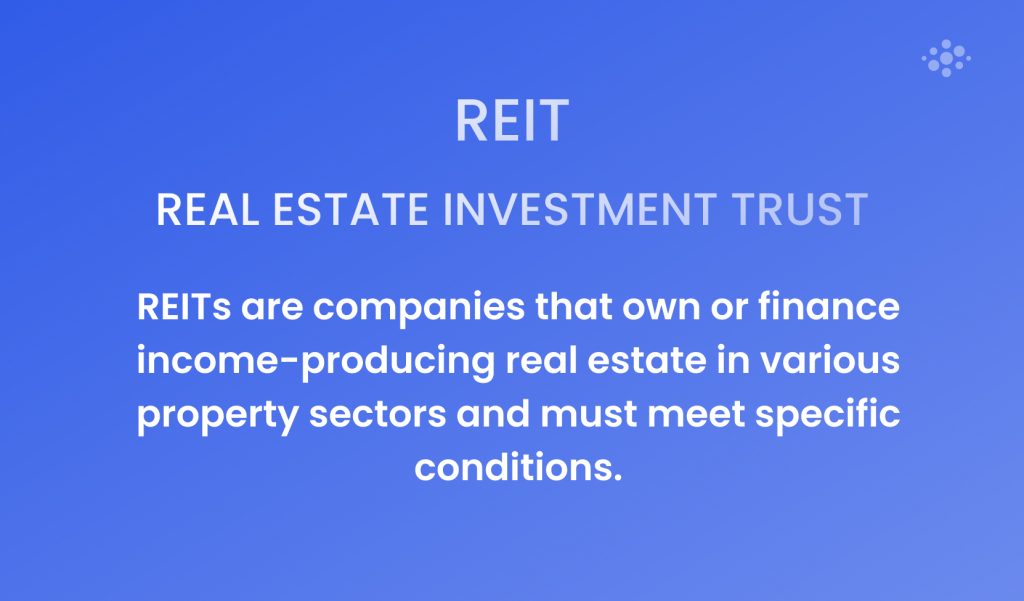What is a Real Estate Investment Trust (REIT)
A Real Estate Investment Trust (REIT) is a company that owns, manages, or finances real estate to generate income. Because REITs are set up as companies, investors can get access to the income and profits made by the assets they own.
In addition, a REIT is a tax-favored structure, and a company must satisfy the following IRS requirements to qualify for REIT status:
- The investment portfolio of the entity must consist of a minimum of 75% real estate assets.
- At least 75% of the total gross income must be generated from sources such as rental income from real property, interest on mortgages that finance real property, or proceeds from the sale of real estate.
- The entity is required to distribute a minimum of 90% of its taxable income to shareholders in the form of dividends on an annual basis.
- The entity must be structured as a taxable corporation for tax purposes.
- A board of directors or trustees must oversee the management of the entity.
- The entity must have a minimum of 100 shareholders.
- Five or fewer individuals can hold no more than 50% of the entity’s shares.

Types of Real Estate Investment Trusts
Real Estate Investment Trusts (REITs) can be grouped into four main categories. However, each category has subcategories that specialize in specific types of properties or assets. For example, one REIT might focus on apartment buildings, while another might specialize in shopping malls. These different types of REITs allow for specialization within the real estate market, catering to different property types and investment strategies.
Equity REITs
Equity REITs make up the vast majority of real estate investment trusts. Entities own a diverse range of income-producing properties, such as office buildings, shopping centers, and apartment complexes. By pooling funds from investors, equity REITs provide access to a portfolio of properties that individual investors might not be able to afford on their own. The income generated from these properties is distributed to shareholders in the form of dividends.
Mortgage REITs (mREITs
mREITs are very important to the real estate market because they provide the money needed to buy and improve properties. Unlike equity REITs, mREITs focus on providing financing for real estate investments. They purchase or originate mortgages and mortgage-backed securities and earn income from the interest payments on these investments.
Public Non-Listed REITs (PNLRs)
PNLRs are registered with the Securities and Exchange Commission (SEC) but do not trade on national stock exchanges. The liquidity options for these REITs can vary, and they may offer share repurchase programs or secondary marketplace transactions. However, liquidity is generally limited compared to publicly-traded REITs.
Private REITs
Private REITs are real estate funds or companies that are exempt from SEC registration, and their shares do not trade on national stock exchanges. These REITs are typically available only to institutional investors. Private REITs offer a more exclusive investment opportunity, often with higher minimum investment requirements, and provide access to real estate assets that may not be available through publicly-traded REITs.
Risks and Benefits of REIT Investing
Investors are drawn to REITs primarily due to their high liquidity, which sets them apart from other real estate investments. REIT shares can be bought and sold with relative ease, providing investors with flexibility. However, there are additional benefits associated with investing in REITs:
Income: By nature, REITs are required to distribute at least 90% of their taxable income to shareholders in the form of dividends. These dividends are funded by the income-generating properties owned by the REITs. Consequently, investing in REITs can provide a consistent stream of income for investors.
Diversification: REITs historically exhibit low correlation with other asset classes, such as stocks and bonds. This low correlation enables REIT investments to add diversification benefits to traditional investment portfolios. By including REITs in a portfolio, investors can potentially reduce overall risk and enhance returns through diversification.
Governance and Oversight: REITs operate under the supervision of independent directors and auditors who regularly publish performance reports. This system ensures a high degree of operational transparency for investors. By having access to these reports, investors can make informed decisions based on reliable information regarding the performance of the REITs they are invested in.
It is important to note that while REITs offer advantages, they also carry certain risks. Investors should carefully consider factors such as market conditions, interest rate fluctuations, and the performance of the real estate market before making investment decisions. Conducting thorough research and consulting with financial advisors can help investors evaluate the potential risks and rewards associated with REIT investing.
Private Equity Real Estate Explained
Private Equity Real Estate (PERE) refers to the investment strategy that focuses on investing in real estate properties and assets through private equity funds. It involves raising capital from institutional investors and high-net-worth individuals to create a fund dedicated to real estate investments. These funds are managed by private equity firms specializing in real estate.
PRER investments typically involve acquiring, developing, and improving properties with the aim of generating high returns. The investment strategy often includes value-add or opportunistic approaches, where the properties are purchased below market value or require significant improvements to increase their value. Private Equity Real Estate funds may invest in various types of properties, including residential, commercial, industrial, or mixed-use properties.

Types of Real Estate Investment Trusts
Real Estate Investment Trusts (REITs) can be grouped into four main categories. However, each category has subcategories that specialize in specific types of properties or assets. For example, one REIT might focus on apartment buildings, while another might specialize in shopping malls. These different types of REITs allow for specialization within the real estate market, catering to different property types and investment strategies.
Equity REITs
Equity REITs make up the vast majority of real estate investment trusts. Entities own a diverse range of income-producing properties, such as office buildings, shopping centers, and apartment complexes. By pooling funds from investors, equity REITs provide access to a portfolio of properties that individual investors might not be able to afford on their own. The income generated from these properties is distributed to shareholders in the form of dividends.
Mortgage REITs (mREITs
mREITs are very important to the real estate market because they provide the money needed to buy and improve properties. Unlike equity REITs, mREITs focus on providing financing for real estate investments. They purchase or originate mortgages and mortgage-backed securities and earn income from the interest payments on these investments.
Public Non-Listed REITs (PNLRs)
PNLRs are registered with the Securities and Exchange Commission (SEC) but do not trade on national stock exchanges. The liquidity options for these REITs can vary, and they may offer share repurchase programs or secondary marketplace transactions. However, liquidity is generally limited compared to publicly-traded REITs.
Private REITs
Private REITs are real estate funds or companies that are exempt from SEC registration, and their shares do not trade on national stock exchanges. These REITs are typically available only to institutional investors. Private REITs offer a more exclusive investment opportunity, often with higher minimum investment requirements, and provide access to real estate assets that may not be available through publicly-traded REITs.
Risks and Benefits of REIT Investing
Investors are drawn to REITs primarily due to their high liquidity, which sets them apart from other real estate investments. REIT shares can be bought and sold with relative ease, providing investors with flexibility. However, there are additional benefits associated with investing in REITs:
Income: By nature, REITs are required to distribute at least 90% of their taxable income to shareholders in the form of dividends. These dividends are funded by the income-generating properties owned by the REITs. Consequently, investing in REITs can provide a consistent stream of income for investors.
Diversification: REITs historically exhibit low correlation with other asset classes, such as stocks and bonds. This low correlation enables REIT investments to add diversification benefits to traditional investment portfolios. By including REITs in a portfolio, investors can potentially reduce overall risk and enhance returns through diversification.
Governance and Oversight: REITs operate under the supervision of independent directors and auditors who regularly publish performance reports. This system ensures a high degree of operational transparency for investors. By having access to these reports, investors can make informed decisions based on reliable information regarding the performance of the REITs they are invested in.
It is important to note that while REITs offer advantages, they also carry certain risks. Investors should carefully consider factors such as market conditions, interest rate fluctuations, and the performance of the real estate market before making investment decisions. Conducting thorough research and consulting with financial advisors can help investors evaluate the potential risks and rewards associated with REIT investing.
Private Equity Real Estate Explained
Private Equity Real Estate (PERE) refers to the investment strategy that focuses on investing in real estate properties and assets through private equity funds. It involves raising capital from institutional investors and high-net-worth individuals to create a fund dedicated to real estate investments. These funds are managed by private equity firms specializing in real estate.
PRER investments typically involve acquiring, developing, and improving properties with the aim of generating high returns. The investment strategy often includes value-add or opportunistic approaches, where the properties are purchased below market value or require significant improvements to increase their value. Private Equity Real Estate funds may invest in various types of properties, including residential, commercial, industrial, or mixed-use properties.
Investment Management Software Solutions
As a sponsor, it is crucial to possess an extensive understanding of the real estate industry and the capital raise process. Additionally, utilizing a robust asset administration tool can facilitate the efficient and effective management of your fundraising efforts and increase the chances of success for your next raise.
InvestNext is a full-service investment management platform that allows you to efficiently oversee all aspects of your capital raise in one place. From same-day ACH transactions to waterfall calculations, impress your investors through an intuitive investor portal coupled with stylish deal room functionalities to captivate, attract and retain investors.
Schedule a demo today to see how our team can help you to welcome the next level of raising capital.
InvestNext’s content insights are dedicated to providing educational and informational content only and should not be construed as investment, tax, financial planning, legal, or real estate advice. InvestNext is not acting as an advisor or agent to you. Please seek advice from your own experts in these areas. While InvestNext strives to provide accurate information, we make no representations or warranties about the accuracy or completeness of the information contained in this article.
Additional Resources:
To read more on commercial real estate loans, click here.
To read more about commercial mortgage rates, click here.





